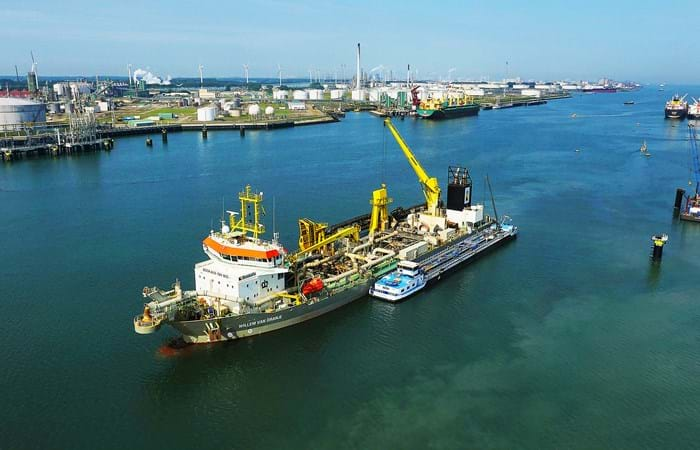The development of the expertise and technology necessary for the international maritime industry to complete its energy transition relies on collaborations with our sector peers, knowledge institutions and other partners. Through this approach we are participants in several initiatives investigating the viability of alternative fuels – including methanol, ammonia, and hydrogen – as well as testing these fuels with leading maritime engine manufacturers.
Organizations we work closely with include the International Marine Contractors Association (IMCA), European Dredging Association (EuDa), Maritime Research Institute Netherlands (MARIN) and Rijkswaterstaat. The following are examples of research projects in which we are involved.
The Green Maritime Methanol project, Phase 2: along with several leading Dutch and international maritime companies and knowledge institutions Boskalis is investigating the feasibility of methanol as a sustainable fuel for the maritime sector. The two-year project extension, which started in 2021, is supported by TKI Maritiem and the Dutch Ministry of Economic Affairs and Climate Policy and is focused on new-build vessels and relevant safety requirements. Researchers have looked at several safety aspects, such as the feasibility of underwater venting to relieve pressure. Furthermore, lab test engines are being modified to test different methods of methanol injection.
Methanol as an Energy Step Towards Zero-Emission Dutch Shipping (MENENS): as a member of a broader maritime consortium, we have launched a multi-year program of over EUR 35 million to conduct research into accelerating the use of methanol as an alternative fuel within the shipping industry. The MENENS program is sponsored by the Dutch Government’s Rijksdienst voor Ondernemend Nederland (Netherlands Enterprise Agency) and aims to develop clean energy technology with a high degree of flexibility and broad applications within the shipping industry, from yacht building to offshore work ships and high-powered dredgers. Methanol can enable significant reductions in CO2 emissions compared to traditional fuels and is viewed within the international maritime sector as one of the most feasible ‘clean’ fuels for large-scale adoption by the industry. A dual fuel methanol combustion engine of approximately 3.5 MW will be developed by our partner Wärtsilä and tested in variable loading conditions to simulate dredging operations. The project builds on findings from the first phase of the Green Maritime Methanol research project.
AmmoniaDrive: NWO and the Ministry of Economic Affairs and Climate Policy awarded funding for this joint research initiative led by Delft University of Technology to further develop knowledge about the use of ammonia as an alternative fuel for zero-emission shipping. Ammonia’s characteristics as affordable, carbon-free and relatively energy-dense make it a potential clean marine fuel for the future. However, significant research is still needed around how to use the energy stored in ammonia to power sea-going vessels. This five-year program will investigate the viability of a hybrid ammonia fuel cell internal combustion engine, including two stroke and four stroke alternatives.
The Clean Shipping Project: a program run by Delft University of Technology in which several academic and private partners are working together to build inclusive, sustainable biobased value chains for maritime biofuels. The project investigates the technical, social and environmental aspects of turning bio-waste into biofuel. The project undertook a successful initiative in Spain which examined the viability of using olive residues as a source for biofuel. A second study has been conducted in Columbia using waste from small-scale coffee and cocoa production. Boskalis’ supply chain and technical functions are working closely with the research team to analyze how these elements influence the biofuel value chain.
SH2IPDRIVE: as part of this multi-stakeholder initiative, Boskalis is supporting research into alternative ways of bunkering and storing hydrogen on board sea-going vessels. The initiative is developing a 300 kW containerized module for storing hydrogen in powder form (NaBH4) and investing techniques for releasing the hydrogen. Associated advantages for the maritime industry include larger-scale storage and transportation potential, safe handling and high-energy densities of the fuel.
